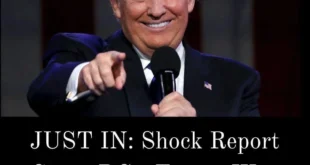The lights of CNN’s studio glared brighter than usual that night. Kaitlan Collins, polished and poised as always, adjusted her earpiece and looked into the camera with a mix of disbelief and disapproval. The teleprompter scrolled calmly before her, but the tone in her voice betrayed something else entirely — frustration. Not the kind of frustration born from breaking news chaos or a technical glitch. This was the frustration of someone who realized that, once again, the outrage machine had failed to find its audience.
America, it seemed, wasn’t angry enough.
The trigger this time? A meme — a ridiculous, over-the-top, sombrero-wearing, fake-mustache meme of Democratic leaders Chuck Schumer and Hakeem Jeffries. It had stormed across the internet like wildfire after being dropped by Donald Trump’s social media team just minutes after yet another fruitless White House meeting on the looming government shutdown.
And the country, instead of gasping in horror, was… laughing.
A Meme Heard ‘Round the Beltway
It started innocently enough — or as innocently as things can in Trump’s America. The former president, now back in the White House and back in command of his favorite weapon — mockery — was facing down Democrats once again in a battle over government spending.
Schumer and Jeffries had emerged from the White House with grim faces and talking points that felt like déjà vu. Cameras flashed, microphones crowded close, and the usual blame game began. Republicans were “holding America hostage,” Jeffries said. Trump was “endangering democracy,” Schumer warned.
But before the echo of their sound bites faded, Trump’s team hit “post.”
In the video, Schumer’s face appeared beneath a cartoonish sombrero. Jeffries sported a curling black mustache straight out of a 1970s telenovela. Mariachi music blared faintly in the background as the two fumbled through their well-worn script about “Republican obstruction.” It wasn’t subtle. It wasn’t polite. It wasn’t even particularly sophisticated.
It was, however, hilarious.
Within minutes, X (formerly Twitter) lit up with laughter. TikTok creators remixed the video with Spanish guitar riffs and captions like “When you realize NPR funding is more important than national security.” Instagram meme pages plastered it across reels. Ted Cruz himself reposted it with the caption: “Arriba, amigos! Government shutdown fiesta!”
And just like that, Trump had once again turned a dull policy dispute into cultural theater.
Schumer’s Speech — and the Sound of a Nerve Being Hit
By noon the next day, the joke had reached the Senate floor.
A visibly irritated Chuck Schumer rose to speak, the solemnity of his voice almost shaking under the weight of his indignation. He didn’t just denounce the meme — he dissected it. Line by line. Frame by frame.
“Let us be clear,” he thundered. “This so-called ‘meme’ was AI-generated — a digitally fabricated video meant to deceive and demean.”
The C-SPAN cameras rolled on as the majority leader wagged his finger, as though America were a classroom full of unruly schoolchildren.
“It is deeply concerning,” he added, “that this kind of digital manipulation is being used to mock public officials and misinform the American people.”
The problem? The American people weren’t misinformed. They just didn’t care.
As Schumer’s voice echoed through the chamber, social media was already turning his outrage into the next punchline.
“Breaking: Schumer confirms he can’t take a joke,” one viral tweet read.
Another added, “Imagine thinking we thought the sombrero was real.”
Kaitlan Collins and the Great Beltway Disconnect
Back at CNN, Kaitlan Collins was having none of it.
Her expression, caught mid-segment, became its own meme before the night was over — eyebrows arched, lips pursed, disbelief radiating from her every gesture.
She ran the clip of the original meme, then Schumer’s reaction, and then Ted Cruz’s laughing response — each one more absurd than the last. Finally, she sighed, turned to her panel, and asked the question that hung heavy with exasperation:
“Is this where we are now? A major political party — the party in power — is using memes, fake sombreros, and mustaches to mock opponents in the middle of a government shutdown?”
The panel nodded gravely. But outside the CNN studio bubble, America was chuckling.
The People Aren’t Angry — They’re Amused
To millions of everyday Americans, the meme wasn’t a national crisis. It was comic relief in a week full of inflation headlines, grocery bills, and gas prices that refused to drop. It was a break from the monotony of political finger-pointing.
After all, what was the alternative? Another solemn lecture from the same politicians who’ve spent years bickering over the same budget lines?
For once, Americans weren’t being told how to feel. They were being invited to laugh. And laughter, it turns out, is the one thing Washington can’t control.
The Meme War of 2025
Trump’s digital operation has always understood something his opponents haven’t: memes are the modern pamphlets of political persuasion.
While Democrats continue to rely on earnest speeches and carefully worded press releases, Trump’s team fires off ten-second clips that capture the mood of the country — frustration, cynicism, rebellion — and wrap it all in humor.
The sombrero meme wasn’t just about Schumer or Jeffries. It was about showing how absurd the whole spectacle had become. While Democrats stood at podiums preaching about “values,” Trump’s supporters were laughing, creating, and spreading culture.
“Own the libs” might sound crude, but it’s brutally effective. Every time a Democrat or a CNN anchor fumes about a meme, they make that meme even bigger.
By the end of the week, “#SombreroGate” was trending number one nationwide. Trump supporters were photoshopping sombreros onto everything from the Statue of Liberty to Schumer’s dog. Someone even edited an image of the CNN logo wearing one, with the caption: “Breaking News: Humor banned in America.”
The Genius of Political Trolling
Trump’s instinct for showmanship is legendary. But in this case, it bordered on tactical genius.
He knew the Democrats would take the bait — and they did. The outrage wasn’t spontaneous; it was predictable.
By denouncing the meme, Democrats guaranteed it would dominate the news cycle for days. CNN panels debated whether it was “racist,” MSNBC called it “a threat to democracy,” and the White House Press Corps pressed the president’s spokesperson on whether the “use of cultural imagery” was appropriate.
Meanwhile, Trump’s communications team was busy looping the meme on screens in the White House Briefing Room. Staffers were reportedly in tears from laughter.
To Trump’s base, it wasn’t just a meme anymore. It was a symbol — a reminder that their president was still the king of political theater, unbothered by media scolding, unafraid of ridicule, and unwilling to bow to the self-appointed referees of taste.
Kaitlan Collins: The Face of Media Exasperation
As Kaitlan Collins continued her coverage, her frustration deepened. Each new poll showed the same thing: Americans didn’t care.
They weren’t siding with Schumer. They weren’t echoing CNN’s outrage. They were laughing with Trump.
By midweek, one of her own network’s analysts quietly admitted on air that the memes might actually be “strategically effective.” Collins cut him off mid-sentence with a tone that could freeze steel.
“Effective? We’re talking about a fake mustache,” she snapped.
But that’s the irony she couldn’t see. The mustache wasn’t the point. The laughter was.
The Democrats’ Real Problem
Lost in the noise of meme outrage was the actual reason the government was on the brink of shutting down: Democrats’ insistence on securing $1.5 trillion in new spending for social programs — including healthcare coverage for illegal immigrants and permanent funding for NPR.
Republicans had refused. Trump had refused. And so, instead of defending their fiscal priorities to the public, Democrats had chosen a far easier target: a meme.
It was the same mistake they’ve been making for years.
When Trump hits them with humor, they respond with lectures. When he punches, they scold. And each time, they look more like the out-of-touch elites they insist they’re not.
To middle-class Americans juggling bills and grocery lists, the sight of powerful politicians fuming over sombreros felt downright comical.
“Maybe if they spent less time whining about Photoshop,” one voter posted online, “and more time fixing the economy, we wouldn’t be here.”
Culture Over Policy
In modern politics, culture always wins. And Trump, whether by instinct or design, has mastered it.
The memes don’t just entertain his supporters — they humiliate his opponents. They strip away the self-importance of the political class and remind everyone that laughter is the one thing the establishment can’t regulate.
By week’s end, even left-leaning comedians were reluctantly acknowledging that Trump’s digital team had “won the internet.” Late-night hosts tried to mock the meme’s crudeness, but their jokes landed flat. When the audience laughs with your target instead of with you, you’ve already lost.
CNN’s Meltdown: A Case Study in Elitism
Perhaps nothing illustrated the cultural divide more clearly than CNN’s on-air meltdown.
Night after night, Kaitlan Collins framed the memes as “deeply concerning.” Guests used phrases like “disinformation threat” and “erosion of political discourse.” But the more serious they sounded, the funnier it all became.
Clips of Collins’ segments began circulating online, set to mariachi music. One TikTok stitched her most dramatic monologue with a clip of Trump dancing at a rally. The caption read: “CNN: Democracy is dying. America: .”
The network didn’t realize it had become part of the show.
The Lesson the Media Still Hasn’t Learned
For nearly a decade, America’s legacy media has been trying — and failing — to understand Trump. They see him as a disruptor, but not as an entertainer. They report on his words without grasping that his audience isn’t watching for politics; they’re watching for theater.
Trump doesn’t just debate. He performs. He doesn’t just criticize. He ridicules.
And as long as networks like CNN take him literally but never seriously, they’ll keep losing the culture war.
The sombrero meme, ridiculous as it may be, was a masterclass in narrative control. It shifted the national conversation away from Democrat talking points about a “Republican-caused shutdown” and reframed it as “look how humorless these people are.”
That framing stuck.
“We Don’t Care.”
By Friday, conservative commentators were echoing the same message across the airwaves:
“We don’t care what CNN says.”
“We don’t care about their outrage.”
“We voted for a president who fights — with words, with jokes, with memes if he has to.”
And that’s exactly it.
The Democrats’ fury only reminded Trump’s base why they love him: he doesn’t play by the Beltway’s rules. He refuses to apologize. He laughs while they lecture. And, perhaps most important of all, he reminds his supporters that they’re not alone in laughing either.
The Shutdown Showdown
Meanwhile, the shutdown clock kept ticking.
As negotiations stalled, Democrats grew more desperate to shift blame. But it was too late. Their fixation on memes had made them look unserious. Their talking points about “protecting democracy” were drowned out by clips of Schumer’s Senate tirade.
The optics were brutal: while the left fumed over fake mustaches, Trump was appearing before cameras talking about energy prices, border security, and protecting American taxpayers.
Every time the media mocked his memes, his poll numbers crept upward.
The Final Irony
In a way, it all came full circle.
The Democrats wanted to frame Trump as the unserious one — a clown, a troll, a meme president. Instead, it was they who ended up looking ridiculous, yelling about sombreros while the rest of the country moved on.
Kaitlan Collins’ frustration wasn’t just about a meme. It was about losing control of the narrative — again.
Trump had done what he always does: taken the political elite’s self-righteousness and turned it into a punchline.
The Last Laugh
By week’s end, one final meme sealed the deal.
It showed Trump standing at a podium, a giant sombrero perched proudly on his head, grinning beneath bold white text:
“THEY STILL DON’T GET IT.”
The caption underneath read:
“We’ll take laughter over lectures any day.”
And that, in the end, was the real story.
Because while CNN and the Democrats cried foul, America was too busy laughing to care.


